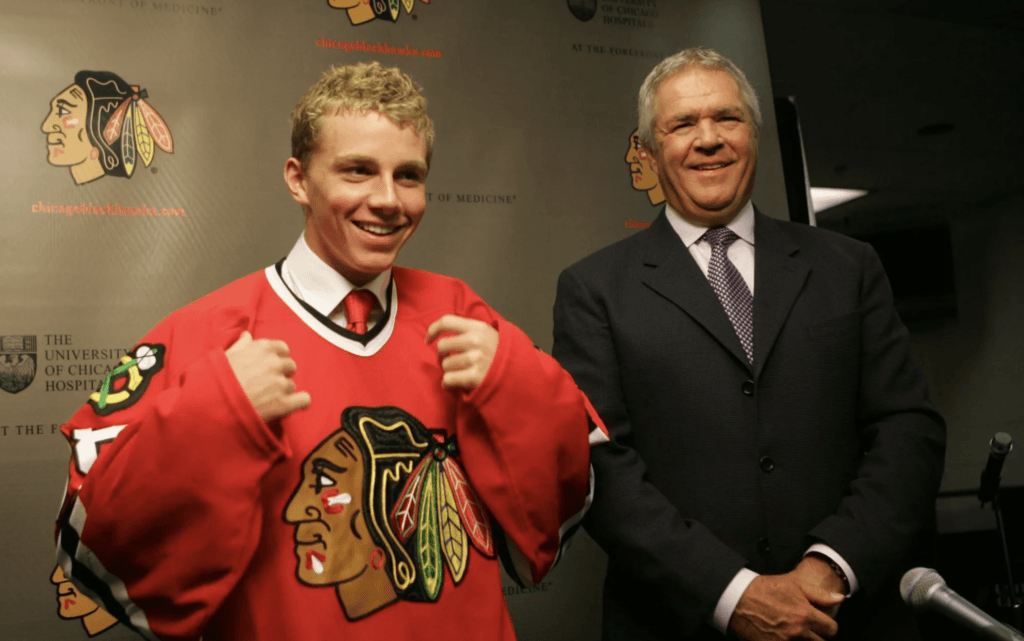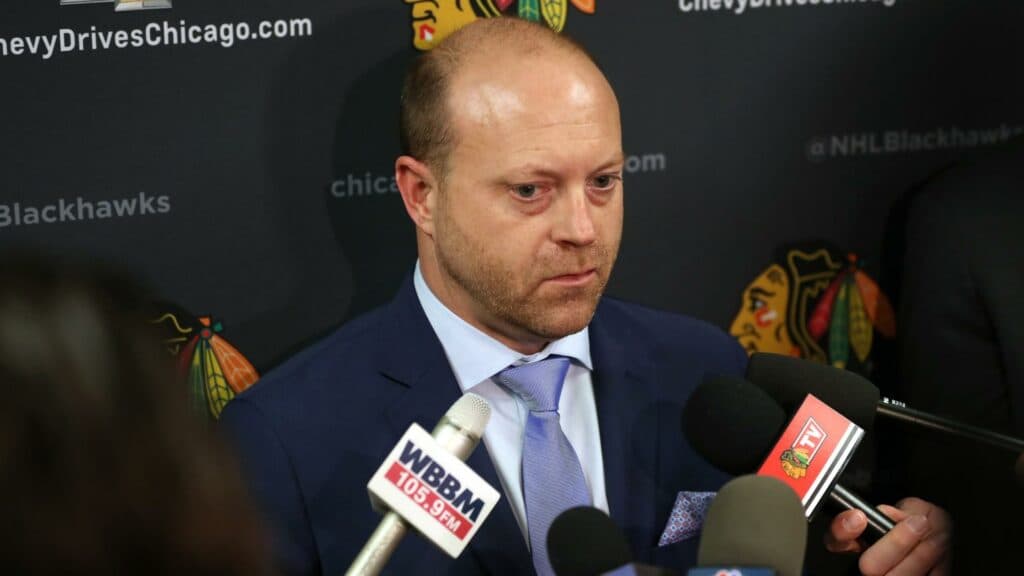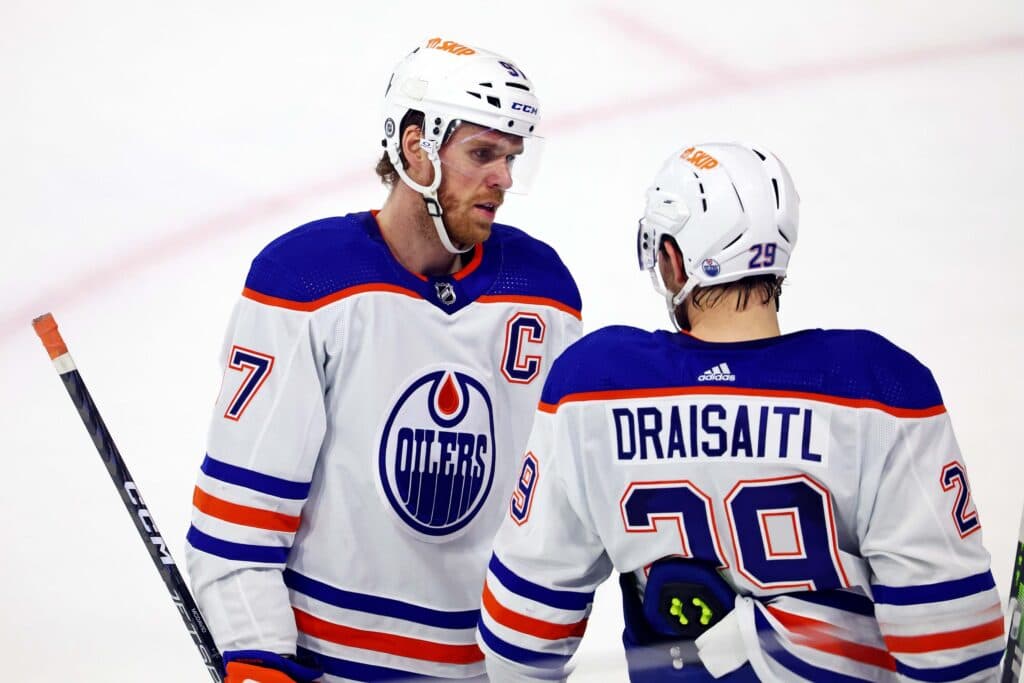Nation Sites
The Nation Network
OilersNation has no direct affiliation to the Edmonton Oilers, Oilers Entertainment Group, NHL, or NHLPA
Digging into Stan Bowman’s time with the Chicago Blackhawks

Stan Bowman has walked into a similar situation in his second job as an NHL general manager as he did in his first — inches from the top.
Days after Commissioner Gary Bettman lifted the indefinite suspension he was given back in 2021, Bowman was hired by the Edmonton Oilers, a team that came one game shy of winning hockey’s ultimate prize in the spring.
Bowman’s tenure as the general manager of the Chicago Blackhawks began with three Stanley Cups in six years and ended in disaster. Bowman resigned from his position a few weeks into the 2021-22 season after an independent internal investigation concluded that he was aware of accusations of sexual assault conducted by the team’s video coach in 2010 but failed to report the incidents to the police or the organization’s human resources department. That video coach pled guilty in 2013 to a criminal sexual conduct in a case involving a 16-year-old high school hockey player in Michigan.
Jason Gregor spoke to Bowman earlier this week and he talked about what he had learned from his time in Chicago, the aftermath and criticism of the scandal, and his work with Sheldon Kennedy. This article will go through Bowman’s time with the Blackhawks from when he was hired in 2005 to when he resigned in 2021 with a focus on the team’s on-ice results.

Then-Chicago Blackhawks general manager Dale Tallon after selecting Patrick Kane with the first-overall pick in the 2007 NHL Draft.
The Blackhawks’ rebuild and taking over for Dale Tallon
Like his father, Hall of Fame coach Scotty Bowman, Stan Bowman never played major junior or professional hockey. Scotty recommended his son send out resumes to NHL teams after he graduated from the University of Notre Dame with a degree in Finance and Computer Applications.
Bowman was hired by the Blackhawks as a special advisor to the team’s general manager in 2001. He stayed in that role for four years before being promoted to assistant general manager, a job that involved working with the salary cap for the Blackhawks, which had been a key outcome of the 2004-05 NHL lockout.
Dale Tallon had previously served as assistant general manager to Bob Pulford, who was fired after the team went 20-43-11-8 during the 2003-04 season, and Bowman became his assistant. Tallon tried to make the Hawks competitive with the signings of Nikolai Khabibulin, Adrian Aucoin, and Martin Lapointe, but the team missed the playoffs in 2005-06 and 2006-07.
Tallon made two very important draft picks in those two years. With the third overall pick in the 2006 NHL Draft, they selected Jonathan Toews from the University of North Dakota. The Hawks moved up from fifth to first overall in the 2007 NHL Draft at that year’s lottery and took London Knights star Patrick Kane as the top choice.
Both Kane and Toews made their debuts in 2007-08 and finished first and third in Calder Trophy voting respectively. The Hawks went 40-34-8 on the season and came up just a few points shy of the eighth and final playoff spot in the Western Conference.
The 2008-09 season saw Chicago break out as a serious contender. Tallon signed top-pairing defenceman Brian Campbell in free agency and traded long-time forward Tuomo Ruutu to the Carolina Hurricanes for Stanley Cup winner Andrew Ladd. The Hawks went 46-24-12 and took down the Calgary Flames and Vancouver Canucks in the playoffs before losing to the Detroit Red Wings in the Western Conference Final.
The following off-season saw Tallon make another major addition in free agency, as elite two-way winger Marian Hossa inked a 12-year, $63.3 million contract to join the league’s most exciting up-and-comers. A few weeks later, team management came under scrutiny after missing the deadline to submit qualifying offers to their restricted free agents.
Though Tallon got all of the players signed, he was demoted to senior advisor while Stan Bowman took over as general manager. There had been speculation about the younger Bowman becoming the team’s next general manager since his father, the aforementioned Scotty Bowman, joined the Blackhawks as an advisor the previous summer.

Chicago Blackhawks captain Jonathan Toews hoists the Stanley Cup after winning his third Championship with the team in 2015.
Three Stanley Cups in Chicago over the course of six years
With the off-season’s work largely finished, Stan Bowman’s first major move as general manager of the Blackhawks didn’t come until during the 2009-10 season. On December 1, 2009, it was announced that Patrick Kane and Jonathan Toews had signed matching five-year, $31.5 million contracts and that defenceman Duncan Keith had signed a 13-year, $72 million contract.
Bowman made two notable trades during the 2009-10 season. Cam Barker, who had been the third overall pick in the 2004 NHL Draft, was moved to the Minnesota Wild for Kim Johnsson and Nick Leddy. He also acquired veteran defender Nick Boynton from the Anaheim Ducks. The Blackhawks went 52-22-8 and won their first Stanley Cup since 1961 when they defeated the Philadelphia Flyers in six games, capped off by an overtime winner from Kane. Dale Tallon left the organization following that season to join the Florida Panthers.
With Chicago’s core locked into new contracts with significant salary raises, Bowman had to move multiple contributors from their championship roster to get under the cap ceiling. Dustin Byfuglien and Andrew Ladd were traded to the Atlanta Thrashers in two separate trades, Kris Versteeg was dealt to the Toronto Maple Leafs, and goaltender Antti Niemi left as a restricted free agent.
The Blackhawks declined to 44-29-9 in 2010-11 and were dropped by the Vancouver Canucks in the first round of the playoffs. The team again had to undergo cap-related roster trimming in the off-season and Troy Brouwer, Brian Campbell, and Tomas Kopecky were all traded away. Chicago went 45-26-11 in 2011-12 and again lost in the first round of the playoffs, this time to the Phoenix Coyotes.
After the first half of the 2012-13 season was wiped because of another lockout, the agreement between the NHL and the Players’ Association resulted in teams getting two compliance buyouts to rid themselves of contracts without a salary cap penalty. This helped the Hawks get underneath the cap ceiling without having to undergo another roster purge in the off-season.
Chicago had arguably their best season in team history during the shortened 2013 campaign. They won the Presidents’ Trophy with a 36-7-5 record and then beat Peter Chiarelli’s Boston Bruins in six games to capture the group’s second Stanley Cup.
By this point, some players that Bowman had acquired started to fill what had previously been a nearly entirely Tallon-built roster. Brandon Saad and Andrew Shaw, Chicago’s second- and fifth-round picks from the 2011 NHL Draft, combined for 19 goals in 2013 while Nick Leddy suited up for all 23 of the team’s playoff games and logged 14:21 per night.
The following off-season saw rugged winger Bryan Bickell, shutdown defender Niklas Hjalmarasson, and goaltender Corey Crawford signed to multi-year contracts and Dave Bolland, Michael Frolik, and Viktor Stalberg shuttled out the door as cap casualties. The Hawks went 46-21-15 in 2013-14 and lost to the L.A. Kings in the Western Conference Final.
The major piece of business that summer for Bowman was getting Kane and Toews signed to contract extensions, as both players were set to become unrestricted free agents after the 2014-15 season. Both players agreed to matching eight-year, $84 million contracts.
The Hawks also signed veteran centre Brad Richards to a one-year, $2 million contract and had to dump Leddy to the New York Islanders for prospects Anders Nilsson, Ville Pokka, and T.J. Brennan right before the start of the season to get under the ceiling. Bowman went all-in at the trade deadline that season by trading the team’s first- and second-round picks in the upcoming draft for veterans Kimmo Timmonen and Antoine Vermette. Chicago went 48-28-6 and beat the Tampa Bay Lightning for their third Stanley Cup in six years.
The Blackhawks of the early 2010s are the closest thing the NHL has seen to a dynasty in the salary cap era. But since that third Stanley Cup in 2015, Chicago’s only victorious playoff round was a five-game play-in series in the summer bubble tournament in 2020. The Oilers must’ve liked what they saw that summer.

Stan Bowman speaks to the media after resigning from his position with the Chicago Blackhawks.
The decline of the Blackhawks and Bowman’s resignation
The turnover following Chicago’s third Stanley Cup was the largest since their first. Brad Richards, Antoine Vermette, and Johnny Oduya left the team in free agency and Patrick Sharp and Brandon Saad were traded in cost-cutting deals with Artem Anisimov, Trevor Daley, and prospects coming back in return.
The loss of Saad and Sharp was offset by an addition the Hawks had made in the spring. Highly touted KHL free agent Artemi Panarin signed a two-year, entry-level contract with Chicago following a season in which he scored 62 points in 54 games and won the championship with SKA Saint Petersburg. He broke into the NHL with a 77-point rookie season and helped Patrick Kane to the best season of his career, in which he scored 46 goals, put up a league-leading 106 points, and won the Hart Trophy.
The Hawks had 103- and 109-point seasons but lost in the first round of the playoffs in back-to-back years in 2015-16 and 2016-17. With Panarin due a big-time raise as a restricted free agent ahead of 2017-18, Bowman flipped him to the Blue Jackets to re-acquire Saad along with goaltender Anton Forsberg. Chicago also lost two long-time members of their core that summer. Marian Hossa’s career came to an end due to a skin issue and Nik Hjalmarsson was moved to the Arizona Coyotes in a cap-saving deal.
The team continued to cycle in young talent to offset the losses of veteran players. Alex DeBrincat, the Hawks’ second-round pick from the 2016 NHL Draft, scored 28 goals as a rookie in 2017-18 while 2014 first-round pick Nick Schmaltz scored 21 goals. Despite that, a weakened defence along with a mid-season injury to goaltender Corey Crawford ultimately sunk Chicago’s season.
The Hawks went 33-39-10 in 2017-18 and missed out on the playoffs for the first time since Kane and Toews’ rookie season a decade earlier. They dropped 33 points in the standings from where they were the previous season.
A few weeks into the 2018-19 season, Bowman fired head coach Joel Quenneville, who had been behind the bench for all of the team’s Stanley Cups. Quenneville had been another acquisition by Dale Tallon, as he took over after Denis Savard was fired four games into the 2008-09 season. The Hawks went 30-28-9 the rest of the way under Jeremy Colliton and missed the playoffs for the second year in a row.
The pandemic-shortened 2019-20 and 2021 seasons again saw the Blackhawks ice slightly different versions of a middling team, though they did manage to squeeze into the expanded playoffs and beat the Oilers in the summer of 2020. They were carried offensively by Kane and DeBrincat and their ability to keep the puck out of the net deteriorated as Toews, Keith, Seabrook, and Crawford aged.
Bowman gave the Hawks a major overhaul in the summer of 2021. He traded Keith to the Oilers to clear salary cap room and acquired Seth Jones from the Blue Jackets and Marc-Andre Fleury from the Vegas Golden Knights.
That same summer, Kyle Beach filed a lawsuit against the Blackhawks organization for failing to properly handle his report that he was sexually assaulted during the playoffs in 2010. In late October of that year, the Blackhawks released the findings of the independent investigation of the situation and Bowman, along with senior vice president of hockey operations, Al MacIssac, resigned from their positions.
The team got off to a horrendous start that season, as they dropped their first nine games out of the gate. Their first win didn’t come until November and the Blackhawks ultimately wound up going 28-42-12, their worst finish since all the way back in 2005-06.

Apr 17, 2024; Tempe, Arizona, USA; Edmonton Oilers center Connor McDavid (97) talks with center Leon Draisaitl (29) during the second period of the game against the Arizona Coyotes at Mullett Arena.
What does it all mean?
In hiring Stan Bowman, the Oilers either believe that he’s learned from his role in helping to cover up a sexual assault and will act differently in the future or that it doesn’t matter to them entirely. Bowman is ultimately being hired because of his experience in having won the Stanley Cup, which was the case with Peter Chiarelli and Ken Holland before him.
Chiarelli came in at the beginning of the Connor McDavid era and endeavoured to build something similar to the hard-nosed, physical, and defensively sound Boston Bruins that won in 2011 and nearly did so again in 2013. Pistol Pete made big trades and was aggressive in free agency but his team made the playoffs once in 2016-17 and fell out in the two seasons afterwards.
After Chiarelli was fired during the 2018-19 season, Ken Holland came over from the Detroit Red Wings to clean up the mess. The old vacuum salesman was able to fill some cracks and immediately got the Oilers back into the playoffs. He shot himself in the foot multiple times but managed to build a contender around Connor McDavid and Leon Draisaitl that was good enough to win a Stanley Cup.
Here we are now with Stan Bowman, who’s back in a very similar situation now to when he replaced Dale Tallon as the general manager of the Blackhawks in 2009 — inches from the top. It’s a shocking position for Bowman to be placed in given he appears to have played a larger role in the downfall of the 2010s Blackhawks than their rise.
Though Bowman helped in augmenting Chicago’s three Stanley Cup teams, their rosters comprised largely of players that were inherited. His tenure with the Blackhawks featured some solid draft picks, a mixed bag of trades with more losses than wins, and neverending salary cap hell. Bowman’s parting gift was the eight-year, $76 million contract with Seth Jones that’s widely viewed as one of the worst in the NHL.
For a resume that features three Stanley Cups, Bowman carries considerable burden and questionable upside. He’s got another chance here in Edmonton and has a lot to prove.
Breaking News
- Another hat trick from a defenceman as Ekholm’s trio of tallies lift Oilers over Ducks: Recap, Reaction and Highlights
- 20 years ago today, the Oilers acquire Jaroslav Spacek and Dick Tarnstrom
- GDB 54.0: Oilers need wins against Pacific foes to secure home ice advantage (6:30 PM, Prime)
- Scenes From Morning Skate: Samanski’s big debut and Kapanen’s retrun
- A look at the impact Oilers’ Zach Hyman and Evan Bouchard have had since Team Canada released its Olympic roster
